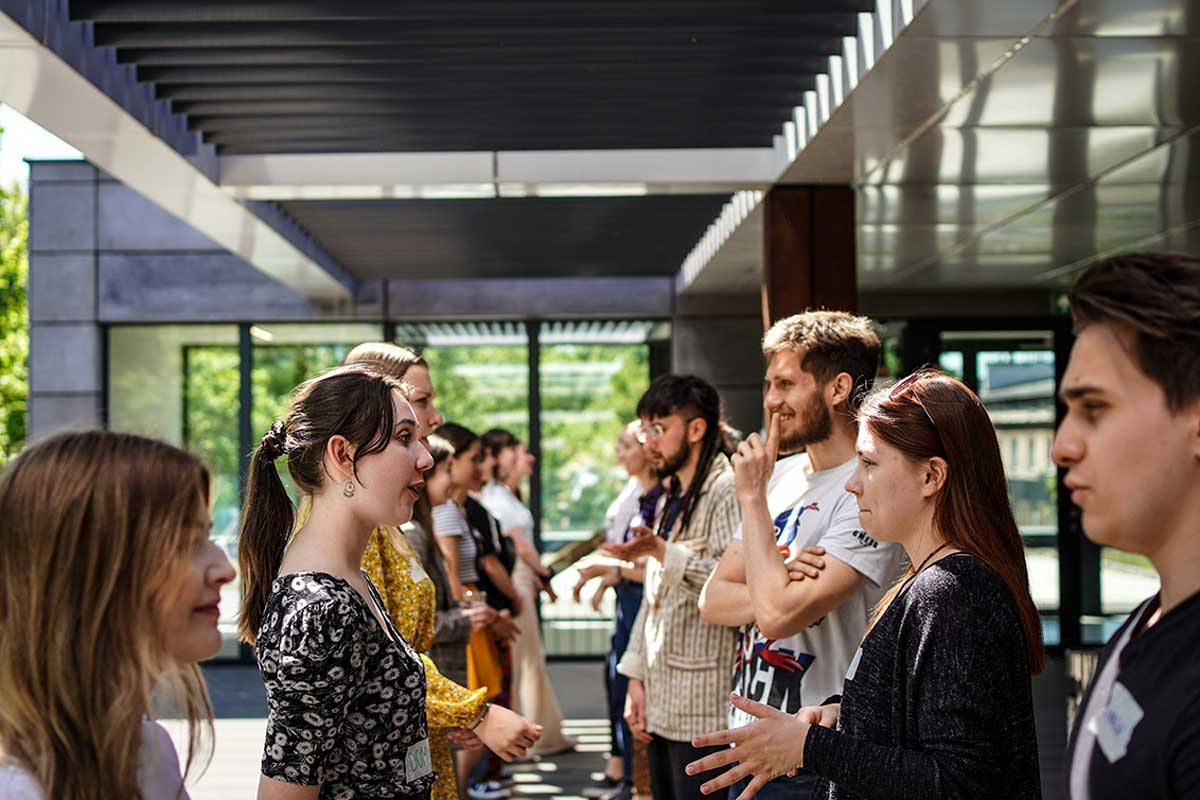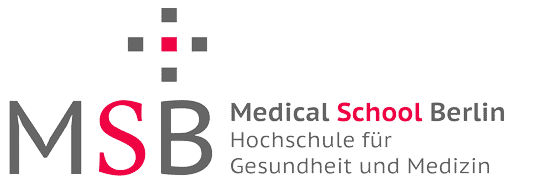Social Work
Semester Start Date: 1st October
Full-time: 4 Semester
120 ECTS
550 € / month (Status 04/2025)
Courses taught entirely in English.
Studis Online bietet mit dem Studienprofil Hochschulen und Unis im Hochschul- und Studienfachverzeichnis die Möglichkeit, ihre Studienfächer gegen eine Bezahlung ausführlicher vorzustellen als mit den von uns recherchierten Basisinformationen. Die Richtigkeit der Informationen zum Studiengang verantwortet auf Studis Online-Seiten mit Studienprofil die Hochschule. Mehr Informationen zu Studienprofilen bei Studis Online gibt es hier.

Social Work (M.A.)
Social work stands for responsibility. It consistently promotes individual well-being and the participation of people in society. As a human rights profession, it strengthens self-determination and self-efficacy, promotes the health integrity of disadvantaged people, ensures the social cohesion of the community, fights against poverty, and advocates for social justice in society.
Well-qualified specialists who are professionally capable of organizing sustainable conditions for effective social work in an assertive and level-headed manner are needed in all areas of social and health care. In short, strong personalities who want to take on leadership responsibility for social work in society in the future are in demand.
In line with the international orientation of the Master’s program in Social Work and the requirements for professional integration into the German-speaking social sector, students are required to provide proof of German language proficiency at the C1 level of the Common European Framework of Reference for Languages (CEFR) before completing their final semester. The Career Center at Medical School Berlin offers optional language courses for a fee, ranging from A1 to C1 level of the Common European Framework of Reference for Languages (CEFR), to support students in gradually building their language skills up to the required proficiency level.
The program corresponds to the state-recognized Master’s degree in Social Work and is conducted in English. Notifications of changes are currently being processed by the Senate Administration and the Accreditation Council.
Study content
The accredited and state-recognized Master's degree program in Social Work (M.A.) offers students a modern and stimulating learning environment designed by proven academics and practitioners. In addition to the theoretical modules of the academic disciplines, the lecturers provide precise and well-founded information on how research methods are used to determine needs and what support is appropriate for the various forms of disadvantage and stress in the many areas of social work.
As a student of the Master's program in Social Work, you will be able to analyze problems, conflicts, and crises in a self-confident and self-conscious way and to develop sustainable solutions for individuals, institutions, or the social space of an urban area. You will learn to plan specific assistance and to know how this is financed, implemented, and finally evaluated. You will be able to analyze and further develop complex issues with suitable research designs. You will have a comprehensive and well-founded knowledge base, identify mental disorders in children, adolescents, and adults, and derive appropriate interventions from them.
Program content
One focus of the degree program is on providing in-depth knowledge in the areas of psychosocial counseling and developmental support as well as target group-specific intervention in the context of social psychiatric and social medical care. In particular you learn systemic and solution-oriented approaches and counseling methods, which qualify you for work in counseling centers, but are also fundamental for your communication skills as a social manager. In addition to systemic competences, students acquire explicit knowledge of psychodynamic-interactional pedagogy.
With the modern concept of blended learning, a sensible mix of face-to-face study in classrooms, virtual teaching, and self-study, you can study at Campus Berlin as well as at your personal favorite place of learning. Because our standard of quality is that a Social Work degree program must have both. Without attendance, students cannot be professionally supervised, and content cannot be taught in a methodologically diverse way. Group dialogue and self-confident exercises must be experienced and reflected on campus. This is the only way to learn to work with people for people. Social skills must be taught socially in a natural social environment.
However, according to today's standards of teaching, quality also means integrating virtual teaching formats in a didactically meaningful way into your studies. At MSB, you study according to a reliable, clearly structured timetable with flexible components of face-to-face teaching in classrooms, online teaching, and guided self-study. Each teaching format is interrelated and follows a stringent common thread with comprehensible learning objectives. At MSB, virtual learning means developing your own learning style under guidance and training it as a learning strategy in order to achieve a goal-oriented conclusion.
For a good theory-practice transfer, we encourage you to work in a social organization during your studies. Although you are a full-time student, you only have to study three days a week. In addition, during the so-called attendance week, you only visit campus once a month. For the remaining three weeks of the month, you study virtually at your favorite learning location. In short: you have the best opportunities to work alongside your studies and to choose your learning locations individually.
Admission requirements at a glance:
Authorization to study in Master's degree programs according to § 10 BerlHG
First professionally qualifying university degree (diploma, bachelor) in Social Work, Social Pedagogy, Special Education, Transdisciplinary Early Intervention, or a comparable degree program.
The degree program at MSB is NC-free (Numerus Clausus free). Following your application, we will assess your personal motivation in an individual admissions interview.
The possibilities for financing a university degree are diverse. Each student must individually decide which option is best suited to their personal situation. We have compiled some examples for you.
Career opportunities
The number of vacancies in social work is enormous. Many vacancies remain unfilled because the number of university graduates does not match the needs of the labor market. Both public, independent, and church organizations and institutions are constantly looking for well-trained professionals for basic work and management positions.
On the basis of current developments, this already high demand is expected to increase further. This applies in particular to social workers with a master's degree, as they fulfill the specific practical fields of social work with empirical knowledge, methodological expertise, competences in quality management, and knowledge of the health care system and social systems.
The Master's degree program qualifies graduates for activities in the following areas:
Counseling Centers
Youth services and social services
Inpatient child and youth welfare facilities
Penal system
Public health service
Social-medical rehabilitation
Hospitals
Schools and daycare centers
Family Centers
Coordination and planning centers (e.g., social planning)
Political posts
Administrative bodies at the federal, state, and municipal levels
Training and further education
Research projects
Universities
Contact
MSB Medical School Berlin – Hochschule für Gesundheit und Medizin
Rüdesheimer Str. 50
D-14197 Berlin
+4930 7668375 -619
More information about the Master's degree in Social Work can be found on the university website.
Flourish and Grow at MSB Medical School Berlin
MSB Medical School Berlin is a private, state-recognized university located in Berlin-Wilmersdorf. The philosophy of MSB is based on the growing demand for qualified professionals in the healthcare market and the need for practice-oriented academic training. We offer highly innovative and market-driven degree programs with a focus on health and medicine, enabling students to meet the challenges of future interdisciplinary healthcare. In our degree programs, in addition to teaching fundamental competencies, interdisciplinary and especially subject-specific professional skills are emphasized.
Teaching at MSB takes place in three faculties. Students can pursue either application-oriented bachelor's and master's programs leading to a university of applied sciences degree (Faculty of Health Sciences) or academic programs leading to a university degree (Faculty of Medicine, Faculty of Natural Sciences). In 2020, MSB received official recognition from the Berlin Senate Chancellery – Science and Research to offer medical training at a university level. Since then, the MSB has offered the state examination program in Human Medicine at the Faculty of Medicine in cooperation with Helios Klinikum Berlin-Buch. The program meets all quality standards for medical education in Germany, concludes with the state examination, and entitles graduates to obtain a medical license (Approbation).
With the implementation of the new Psychotherapists Act on 01.09.2020, psychotherapists can now be trained through a direct degree program followed by further specialization. MSB supports this new path and offers all necessary steps under one roof, up to the start of a professional career. Students who began their bachelor's studies before this date can still complete their training as psychological psychotherapists under the old model during the 12-year transitional period. The IPB Institute for Integrative Psychotherapy Training Berlin, as a state-recognized training institute within MSB, offers training to become a licensed psychological psychotherapist as well as a child and adolescent psychotherapist.
Personal Support
To best support your potential, MSB promotes small study groups, lives the principle of "open doors," and thereby creates space for engagement, ideas, and growth to ensure university life remains innovative and exciting. MSB fosters a very personal atmosphere. Professors and students know each other, and faculty and university management are always approachable. There are no fixed office hours. Every email is answered, and there is always time for a conversation. Our Career Center and International Office are available to provide advice and support as you prepare for a career in the healthcare sector.
Research and Teaching – Theory and Practice in Synergy
Being professionally competent and using expertise responsibly are essential qualities for future professionals in the healthcare sector. At MSB, highly qualified academic teaching staff collaborate with experienced partners from practical fields. This prepares you optimally for your future societal responsibilities. In line with the concept of research-based learning, you will participate in the university's scientific activities and, during your work-oriented studies, become familiar with relevant healthcare practice fields through MSB’s cooperation partners. Teachers and students are in continuous dialogue and mutually supportive interaction.
Broadening Horizons Beyond Your Own Field
Studying at MSB also takes you beyond the classroom. Through excursions, internships, and interdisciplinary projects, you will gain and appreciate new perspectives. Throughout your studies, you will regularly collaborate with fellow students and lecturers from other disciplines in joint projects and courses. In all degree programs, students also acquire important social, communication, and reflective skills that are essential for success in healthcare and for shaping their professional environment in interdisciplinary teams.
Room for Growth and Development of Potential
Studies at MSB are not subject to numerus clausus (NC). At MSB, motivation and talent are more important than grade point average. In an individual admission interview, you have the opportunity to demonstrate your commitment and social skills to MSB.
A Unique Learning Atmosphere in an Exciting (Health Policy) Environment
The university building on Rüdesheimer Straße, in the quiet district of Wilmersdorf, offers a unique learning and working atmosphere with its listed rooms, a new building connected to the historic structure, and a spacious park area. And all this in the heart of Berlin – a city where cultural, social, and societal trends are set, including in the healthcare market. The region offers a wide range of healthcare-related institutions, such as opportunities for internships and project-based studies, collaboration with practice partners, or career entry after graduation.










